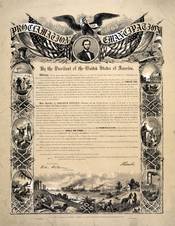The 13th Amendment to the Constitution, officially ending the institution of slavery, is ratified. "Neither slavery nor involuntary servitude, except as a punishment for crime whereof the party shall have been duly convicted, shall exist within the United States, or any place subject to their jurisdiction." With these words, the single greatest change wrought by the Civil War was officially noted in the U.S. Constitution.
The ratification came eight months after the end of the war, but it represented the culmination of the struggle against slavery. When the war began, many in the North were against fighting what they saw as a crusade to end slavery. Although many northern Democrats and conservative Republicans were opposed to slavery's expansion, they were ambivalent about outlawing the institution entirely. The war's escalation after the First Battle of Bull Run in July 1861 caused many to rethink the role that slavery played in creating the conflict.
By 1862, Lincoln realized that it was folly to wage such a bloody war without plans to eliminate slavery. In September 1862, following the Union victory at Antietam, Lincoln issued the Emancipation Proclamation, declaring that all slaves in territory still in rebellion on January 1, 1863, would be declared forever free. The move was largely symbolic, as it only freed slaves in areas outside of Union control, but it changed the conlfict from a war for the reunification of the states to a war for the destruction of slavery.
Lincoln believed that a constitutional amendment was necessary to ensure the end of slavery. In 1864, Congress debated several proposals. Some insisted on including provisions to prevent discrimination against blacks, but the Senate Judiciary Committee provided the eventual language. It borrowed from the Northwest Ordinance of 1787, when slavery was banned from the area north of the Ohio River.
